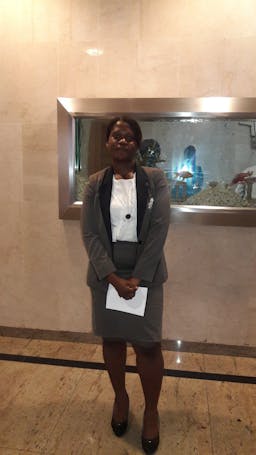My Journey
Apr 28, 2022
Story
I remember some few years back when a population census was held in my country and some data collectors came to my house to capture our details. We had just moved to our newly completed house then and was still a bit unfamiliar with the community. On asking for my age I told one of the collectors I was 17, and the next question she asked me was " how many children I had? My Mum expressed her shock at this question and the collector responded that it wasn't her fault, that she had just come from a house where someone my age already had 2 children". To say I was surprised was to put it mildly. This however was an insight into what I have and most others have come to accept as a norm in my community.
I come from Abeokuta, the capital city of Ogun State Nigeria, I however spent my growing up years in Lagos State, the economic capital of West Africa. I currently live in Sango Ota, a city in Ogun State. The last of two children, my sister and I had an interesting time growing up in one another's company. Due to a number of reasons I ended up attending 3 primary and 4 secondary schools, an experience which I am not soon to forget as it has enlightened me in so many ways.
My present community is made up of a mixture of literate and illiterate persons with a larger percentage being illiterate. Apart from two public secondary schools and one public primary school, the other schools found in my community are privately-owned. Needless to say that a major challenge faced in my community is a dearth of quality schools to adequately meet the demand for education. Members of my community depending on their level of education or lack of it have occupations ranging from petty trading, farming, artisans, drivers, with a very few being professionals of one sort or the other. The poverty level is also quite high as people, especially women have to survive on proceeds from their petty trading to sustain themselves and their families. This poverty more than any other thing leads to a huge influx of students in the few public schools that are available since it is only those that can afford it send their children to private schools.
An alarming trend I have however come to observe is the high frequency of teenage pregnancy and teenage mothers in my community which I hinted at in my introductory paragraph. Most girls hardly conclude their secondary school education before they turn up pregnant. This of course signifies an end to education to those girls as what they then focus on is how to raise their child which soon becomes children in no time. Sadly girls that conclude secondary school education do not fare much better as they rarely proceed to the university or polytechnics too. Often times they end up having children out of wedlock also or they learn a craft or handiwork and ultimately get married. This only leads to the perpetuation of the poverty cycle. The boys are not exempted from this cycle either as those who do not drop out of secondary school amongst them only graduate to become drivers, artisans or criminals.
A major reason I think has contributed to this ugly trend is what I perceive to be a dearth or lacuna in the education these students are given. Apart from not having enough qualified manpower to even teach them, they are not taught anything beyond how to pass their certificate exams leaving a huge gap in mentoring, and other social activities that could better integrate these students into being responsible members of the society. A lack of role models is also a big challenge.
I have not done anything so far in helping to address these problems mostly because I have not been 100 percent present in the community but I am considering starting now. Basically I am looking at organising a series of extra-curricular activities that would focus on sexual/reproductive health, capacity building, mentoring, role-modelling and the likes. This I hope will impact on the girls and cause a huge turnaround in the teenage pregnancy rate so that they can achieve their full potentials as women and as humans.
In terms of support I believe I would need people more than any other resource, time is also needed, planning, and organising skills will also come into play.




